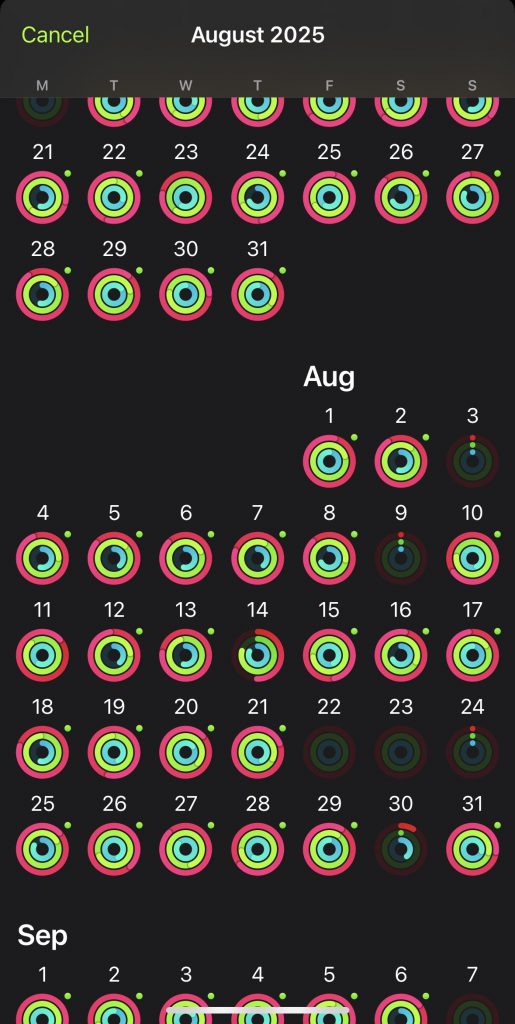Who am I without Apple Watch?
This blog is an incarnation of everyday annoyance: once I cycled 25 minutes to the tennis courts, only to discover I’d forgotten my Apple Watch and immediately turned around to fetch it. On the way I cycled to the tennis courts again, I suddenly realised it seems to me no longer doing sport because I like to or I believe certain benefits it brings me, but on the contrary, I want to record the fact that I move to close the three rings in my apple watch. Therefore, this blog was sketched to reflect my ongoing imagining of the relationship between self and technology.
This notion creates a kind of epistemology anxiety that is the very existing of myself is now relay on external verification. I start to reflect on multiple moments that happing in my life: I’ve been obsessed to record myself through technology, with one of the most important aspects is relate to health in weight, diet, exercise, sleeping. Well, as human there is nothing to blame for to want to know oneself better, however, is those numbers actually represent a better way to communicate with self? Or is it just a delusion that one has control over one’s body? Personally, I personal think that also contributes from my lack of knowledge of my own body, as I don’t have medical training on how to interpret the signal from my body, it is kind of a necessity to outsource this work to technology. But, I stopped myself there, does that means my own feelings, my emotions, my sense of myself is not valid – I have to believe a certain stander to tell me what to do. The obsession is going beyond self-tracking to the technology itself, as we always think that resentment is something objective, which is the synonym for truth.

Some answers
As technology more seamlessly and unobtrusively integrates into our lives, the very perception of autonomous subjectivity appears increasingly untenable. With the development of digital infrastructures capable of collecting, storing, and analysing data, the technology has come to constitute the environment itself in framing how we perceive, interpret, and act in the world (Aydin et al., 2019). For Merleau-Ponty (1962), the body is the medium between the self and the world. As this body is entangled with technologies, those mediations may extend into the formation of subjectivity itself. The popularisation of digital self-tracking devices demonstrates this shift, reorienting the body’s sensory experience toward recognisable information. The recorded number is often treated as measurable against metrics, which metrics generate a sense of responsibility to discipline oneself accordingly (Juchniewicz & Wieczorek, 2024). However, measurement renews the expectation to adjust, creating accountability that exceeds any single act of tracking.
Self-tracking converts imperceptible bodily and mental details into coherent streams of information, establishing “a direct relation between the body and the self, between biology and knowledge, between technology and truth” (Ajana, 2017, p. 4). As Aggerholm et al. (2025) note, it reconfigures embodied experience by reducing sensations into parameters, externalising bodily states as digital traces, and imposing an optimisation imperative, thereby displacing lived experience with quantified interpretation. Thus, the self comes to be known through technologically mediated interpretation, requiring individuals to learn to understand themselves as data subjects (Lupton, 2016). Yet such mediation is not passive, for it acts as normative referents through embedded assumptions about health, productivity, and well-being. As blended into the interfaces, self-worth becomes equated with the numerical progress and algorithmic validation, constructing the good self as one validated by algorithmic success (Krzemińska, 2024). Aligning with the neoliberalism optimisation that conceives individuals as projects demanding constant development, improvement, and investment, self-tracking has colonised life itself as a moral responsibility to shape and maintain one’s body in accordance with social norms of worth and adequacy (Krüger, 2019). Within this regime, the cultural imperative to produce productive subjects renders responsibility a labour of continuous self-surveillance and self-governance.

But there is more to it!
The discussion above has examined self-tracking as a technology mediating the relation between body and self, through which individuals internalise the necessity of governing themselves as digital labour to fulfil personal responsibilities within neoliberal self-optimisation requirements. Yet how such responsibility is persistent – as self-tracking is inherently a practice that must be continually performed, why do we feel the need to do it over and over again? It seems that responsibility comes to operate as a form of labour that is characterised not by production but by the ongoing work of maintaining visibility and validity. In there, I want to specifically reflect on what I mentioned before in how to prove the existing of oneself. If the subjectivity is record and exists partially with the data being record, then is this self can be truly autonomous? Maybe the whole ideal of autonomous self is human wishful thinking – I’m a traditional pessimist on such a topic. This concern can be track back to the question on freewill, however, the intention is not to write a book here so I’m not going deeper than that.
But luckily, we can still turn to Bernard Stiegler (1998) for some answers. He proposed concept of tertiary retention that subjectivity is constituted through exteriorised technical existence. As the closer relation between self and technology, the intervention of technology in the very temporal rhythms of everyday life, organising how practices unfold and how the self comes to understand its own activity. Therefore, the self becomes dependent on technological verification through its repeated inscription; the continuous upkeep of data, therefore, becomes a structural labour rather than a voluntary act. This labour is one of the characteristics that can be found in digital media in a world where everything seems subtle and unnoticeable but essentially the demand or restriction is stricter than ever that we could ever imagine.
Reference
Aggerholm, K., Ronkainen, N., & Schmidli, X. (2025). The digi-appearing body: bodily awareness when mediated by digital self-tracking technologies. Phenomenology and the Cognitive Sciences.
Ajana, B. (2017). Digital health and the biopolitics of the Quantified Self. DIGITAL HEALTH, 3, 1–18.
Aydin, C., González Woge, M., & Verbeek, P.-P. (2019). Technological Environmentality: Conceptualizing Technology as a Mediating Milieu. Philosophy & Technology, 32(2), 321–338.
Berg, M. (2022). Digital Technography: A Methodology for Interrogating Emerging Digital Technologies and Their Futures. Qualitative Inquiry, 28(7), 827–836.
Juchniewicz, N., & Wieczorek, M. W. (2024). Self-tracking, background(s) and hermeneutics. A qualitative approach to quantification and datafication of activity. Phenomenology and the Cognitive Sciences, 23, 133–154.
Krüger, S. (2019). The Authoritarian Dimension in Digital Self-Tracking. In Lost in perfection: Impacts of Optimisation on Culture and Psyche. Routledge.
Krzeminska, A. (2024). Self-Optimisation and the Technologically Mediated Self. Historical Social Research, 49(3), 77–101.
Lupton, D. (2016). The Quantified Self: A Sociology of Self-Tracking. Polity Press.
Merleau-Ponty, M. (1962). Phenomenology of perception. Routledge & Degan Paul.
Stiegler, B. (1998). Technics and Time, 1: The fault of Epimetheus. Stanford University Press.


This blog was very interesting to read and it talks about something I have never considered exploring in depths. My experience with tracking apps is a bit different: I’ve tried various of them, but after a while I always forget I even have them on my phone. So I don’t really relate to feeling the need of tracking my bodily functions, because to me it’s just something to do for fun and I forget about it after little time.
A thought I had while reading this was: yes, as humans we have the right to know our body better, but does technology actually help us with that? Or is it just an excuse to have the satisfaction to see the coloured icons on the app, or the rings like you mentioned?
There are a lot of these apps, for example, to track your menstrual cycle. But in this case, what is exactly the difference between tracking it on your phone and, for example, keeping a journal? What does the digital app give more?
Really interesting read! I totally relate to the feeling of needing some sort of tracker to “prove” that I’m doing something. Like, did I really move today if I can’t see it exactly how much? I like how you tie it to self-perception and responsibility…its very true that these devices make me feel like my alue or progress depends on numbers, not just how much better I feel after working out. Makes me really wonder how much of our autnonomy is actually ours when we rely so heavily on these trackers to define ourselves.
I really related to your blog, especially the part where you turned back to get your Apple Watch. That moment clicked with me; I’ve been there, too, when the act of logging the activity seemed to overshadow the activity itself. It got me thinking about how readily technology can become a crutch, something we lean on without a second thought.
Your post also got me considering our reliance on numbers to track our progress. We often turn to rings, steps, and stats to determine if we’ve “achieved” something, rather than simply tuning in to what our bodies are telling us.
I hadn’t considered the implications for our relationship with exercise and well-being until you brought it up. Your blog opened my eyes to how self-tracking can slowly change our self-perception, even when it’s intended to be beneficial.
Exercise, sleep, and diet once belonged to the body’s own rhythms. After data takes over, the body becomes fully quantified. We no longer understand ourselves through pain, relaxation, fatigue, or satisfaction, but through “meeting the target” or “failing the target.” Describing this as labor is extremely precise. Self-tracking is a continuous maintenance task carried out to remain visible and valid inside the system. The paradox of this labor is that it appears voluntary because the system has absorbed the authority over responsibility, health, and even self-worth. Here, technology participates in organizing the temporal structure of everyday life, arranging how its users become a continuous self. Subjectivity is reinforced through repeated recording, yet at the same time, it is formatted by that repetition.